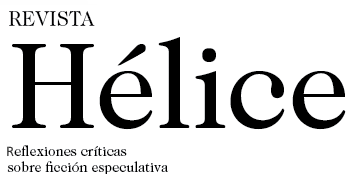CONVOCATORIA
Hélice: Reflexiones críticas sobre ficción especulativa abre la convocatoria para su número de Primavera-Verano (fecha de entrega: 1 de Mayo), para las secciones:
- Reflexiones: artículos académicos originales con bibliografía. Máximo 10000 palabras.
- Miscelánea: textos breves de especial relevancia para los estudios sobre ciencia ficción basados en reflexiones personales de tipo ensayístico no académico. Máximo 5000 palabras.
- Obras: reseñas o ensayos/reseñas de uno o varios libros recientes o más antiguos. Máximo 5000 palabras.
Hélice publica textos en castellano y en inglés. Las normas de edición están disponibles en la página web (www.revistahelice.com).
Contacto:
Mariano Martín Rodríguez (martioa@yahoo.com)
Sara Martín Alegre (Sara.Martin@uab.cat)
Mikel Peregrina Castaños (peretorian@gmail.com)
Special issue of Hélice: Speculative Landscapes
As the Intergovernmental Panel on Climate Change’s Sixth Assessment Report concludes, our planet’s landscapes are rapidly undergoing drastic short-term transformative changes due to anthropogenic factors. The wholesale thawing of Arctic permafrost stands to exacerbate planetary warming to runaway levels (p. 1270); droughts in arid areas are massively exacerbated by agricultural activity (p. 1984); greenhouse gas emissions disrupt natural weather systems so greatly that new microclimates emerge (p. 3514); ocean acidification threatens the viability of aquatic ecosystems (p. 1200); biodiversity is in rapid decline around the globe (p. 211); sea level rise will reclaim vast areas of low-lying land (p. 1687); deforestation leads to greater annual ranges in temperature (p. 2814); and each year, air pollution kills approximately 4.2 million humans (p. 1516).
Contrary to long-standing anthropocentric pretensions, we are beginning to recognise that the world we inhabit is far more than merely a background to human life. Rather, our planetary environment is deeply complex, and reliant upon intricate interrelations within ecosystems. Our landscapes are sustained by both living and non-living actors, and starkly delimit the contours of our daily lives. In this era of sweeping landscape transformation, newly coined terms help us to reconceptualise our positionality as actors within earth networks. Some have proposed that we live in a new geological epoch known variously as the Anthropocene, Chthulucene, or Capitalocene. Others have moved to reject the term human itself, alongside its legacy of colonial and ecological atrocities, in lieu of the term posthuman. Instead of natural, many have proposed, we should begin to regard the world we inhabit as postnatural.
Accordingly, for this special issue of Hélice (www.revistahelice.com), we invite full-length academic papers on the topic of Speculative Landscapes in literature. As new means of conceptualising the interconnectedness of life on our planet become increasingly pertinent, we invite contributions which explore how Science Fiction and/or Fantasy (SFF) texts emphasise the importance of nature, weather, and landscapes. How do these “background” elements transcend the remit of worldbuilding, and dictate the speculative logics of their texts? We are particularly interested in submissions with a primarily textual focus, which provide close readings of the literary texts or series under consideration. Whilst critical frameworks are vital, we ask that these do not intrude at the expense of a tight philological focus, underpinned by attention to textual detail.
Submissions might explore the following themes (although this list is by no means exhaustive):
- Landscapes in Science Fiction texts
- Landscapes in High Fantasy texts
- Ecocriticism and landscapes in SFF
- Posthumanism and landscapes in SFF
- The Anthropocene and SFF landscapes
- Postnatural SFF
- Anthroposcenic SFF
- SFF landscapes and worldbuilding
The deadline for abstract submissions is February 1st 2022. Abstracts should be approximately 250 words, and initial decisions will be communicated during March 2022. For this special issue, please email abstracts to both Jonathan Hay (j.hay@chester.ac.uk) & Sara Martín Alegre (Sara.Martin@uab.cat).
If your article is accepted, the submission date for final versions of articles (5,000 – 10,000 words) will be October 2022, for publication in the Autumn-Winter 2022 issue of Hélice. In addition to editorial feedback, we intend to invite authors whose papers are selected for publication to participate in a mutual peer reviewing process. The general journal style guidelines are available here.
